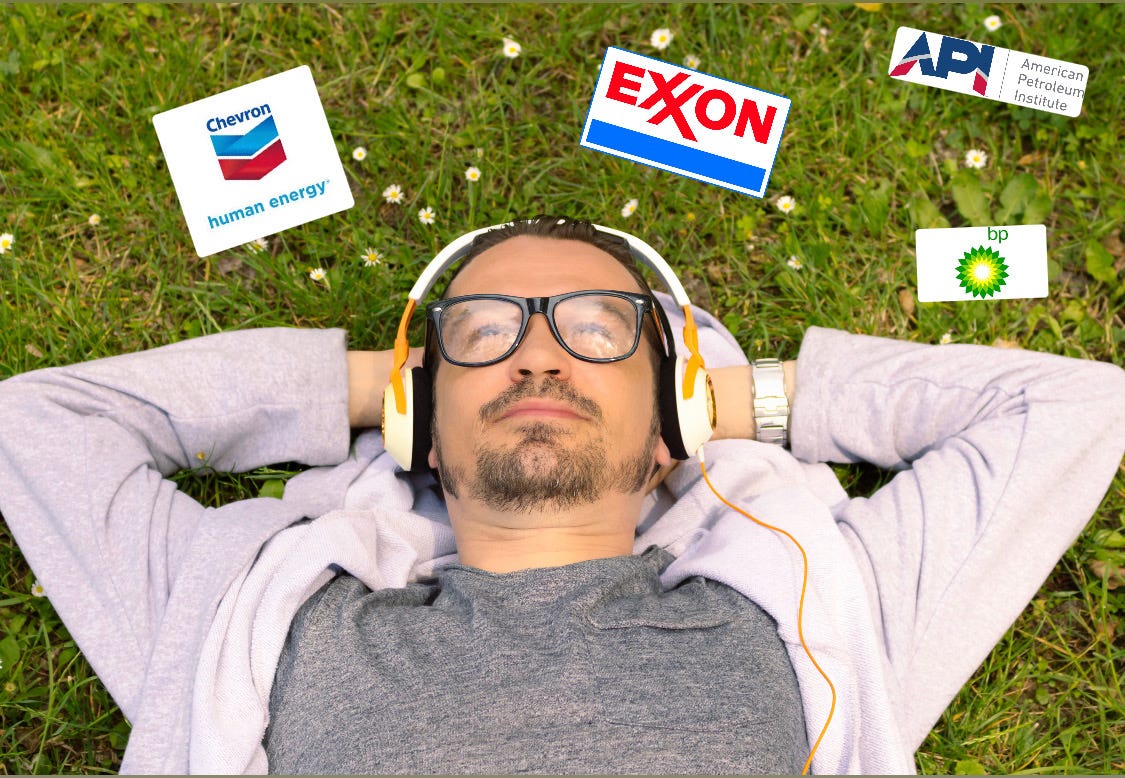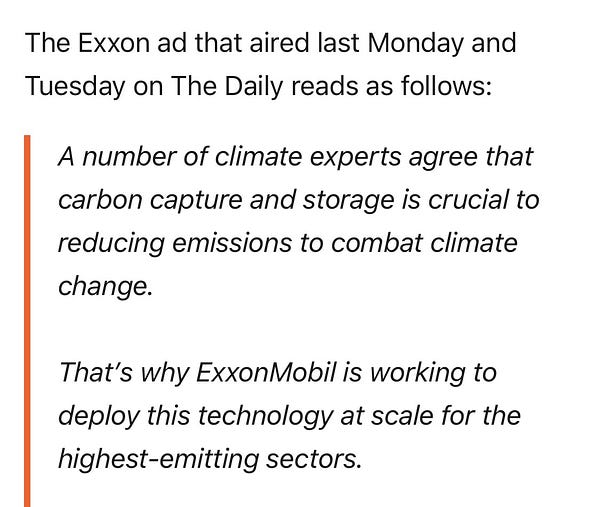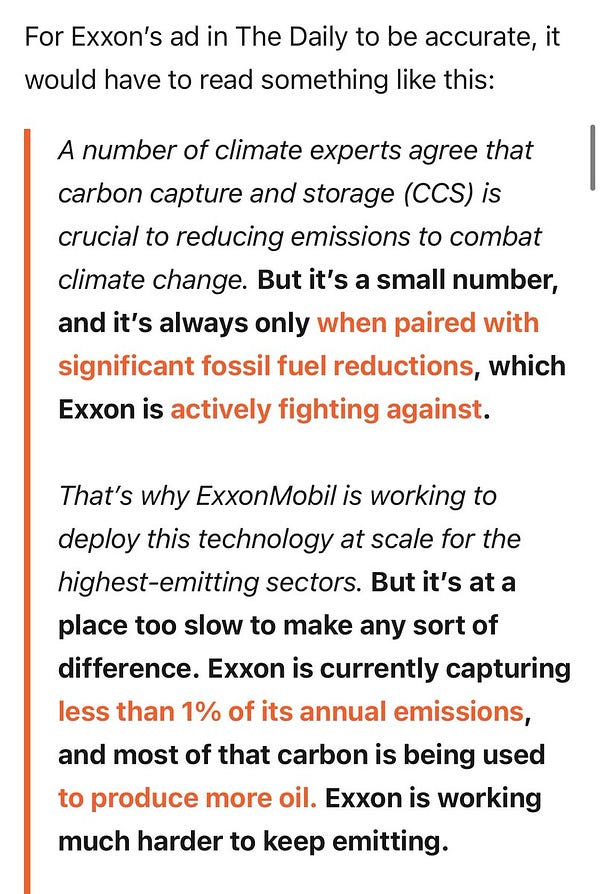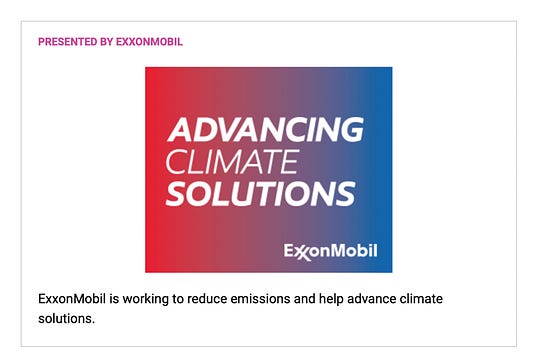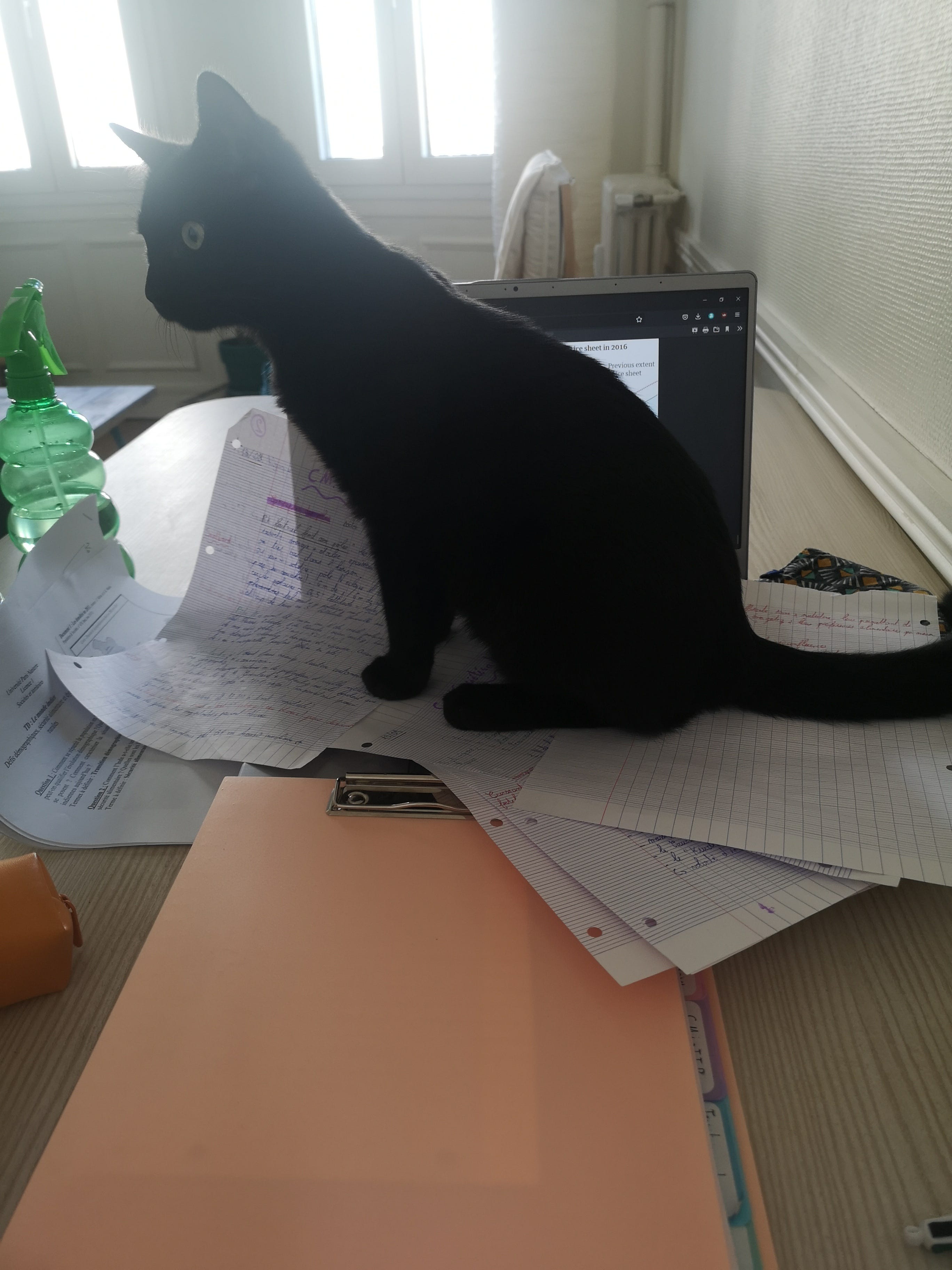Big Oil's favorite way to lie: paltering
If you’ve been enjoying our content lately, it would mean the world to us if you considered supporting us with a paid subscription. Our readers are our sole source of income, so each subscription really goes a long way to ensuring that our unique brand of climate reporting and analysis can continue. Big Oil's favorite way to lie: palteringThis sneaky form of climate misinformation is everywhere. Here's how to identify it.Earlier this week, I sent you a newsletter co-written with Amy Westervelt, an investigative journalist who makes a very badass true-crime climate podcast called Drilled. I briefly mentioned that Drilled has a new season, but I didn’t tell you what the season was about. In Season 8, titled “Light, Sweet Crude,” Amy tells the fascinating story of how Exxon sold the small South American nation of Guyana on oil—and how many of Exxon’s promises to the country wound up being, well, lies. These weren’t just any type of lies, however. They were complicated. Sneaky. “It's clear that they weren't exactly telling us lies,” Guyanese journalist Kiana Wilburg tells Amy in episode 2, “but they weren't telling us the truth either.” I won’t spoil the specifics for you—just go take a listen—but Amy goes on to define Exxon’s promises as “paltering,” the practice of “using statements that are technically true, but also leave out critical information in order to mislead people.” If you’ve read any of HEATED’s coverage of oil industry advertisements before, you’ve probably heard this word. Indeed, “paltering” is a common practice in oil industry advertisements, their marketing, and public communications. You hear it in the ads on your favorite New York Times podcasts, and read it in the sponsorships of your favorite political newsletters. Still, we’ve never devoted a whole newsletter to simply explaining what paltering is, how to recognize it, and what researchers say is the best way to fight it. So that’s what we’re going to do today. Thanks to Amy for the inspiration. What is paltering?Paltering is one of three scientifically-defined forms of deception. Introduced in 2016 by Harvard University and University of Pennsylvania researchers, it refers to the active use of true statements to create an overall false impression. It’s also known as “lying by telling the truth.” Paltering is sneakier than the other two forms of deception. The first, “lying by commission,” is the active use of false statements to create a false impression. This is when you tell your parents “I finished my math homework,” but actually you did not. The second type of deception is “lying by omission,” the passive avoidance of true statements to create a false impression. This is when you tell your parents “I’m all set for school tomorrow,” but you haven’t done your homework. Lying by omission is similar to paltering, as both involve failing to disclose relevant information. But where lying by omission is defined by passively avoiding the whole truth, paltering is defined by actively telling selective truths. Paltering is when you say, “I finished my math homework,” when in reality all you did was take 5 minutes to write “666” in all of the answer boxes. So you did technically finish your math homework, but you did such a bad job that you’re still going to fail. The only thing you achieved is getting your parents off your back by actively misleading them about your activities. This is what oil and gas companies do in their advertisements. Technically, they tell the truth—they’re investing in greener, cleaner technology. But the investments are small, the technology is unproven, and their companies are overall failing to reduce their emissions. The selective truth they choose is designed to create a false impression, so everyone gets off their back about climate change. Here are a few examples of what it looks like. How oil companies use paltering to mislead Last week, The Daily ran a misleading Exxon ad that used a common misinformation tactic called “paltering.”
Paltering uses selective micro-truths to paint an overall inaccurate impression.
Here’s how it works: To illustrate how oil companies use paltering, let’s look at an ExxonMobil advertisement that ran in The Daily, the New York Times’ immensely popular daily news podcast. The ad says:
The ad claims the oil giant is “advancing climate solutions” by investing in carbon capture technology. And technically, Exxon is investing in carbon capture, which is a climate solution. But this truth is incredibly selective. Because overall, Exxon is doing far more to worsen the climate crisis than to solve it. The company is still refusing to slow down fossil fuel production—in fact, it plans to expand its oil and gas business. A Chevron ad that ran in Semafor similarly palters. It says Chevron is “working with partners in California to convert the methane from cow waste into renewable natural gas,” and is therefore “working toward a lower carbon future.” It’s like if the world’s greatest hit man started investing in hospitals, and took out an ad claiming he’s “advancing murder solutions.” Sure, hospitals can prevent murder. But if you’re still going around shooting everyone, your relatively small healthcare investment doesn’t matter. Paltering helps the hit man give the false impression he’s saving people, when in reality, he still makes all his money killing. Similarly, paltering helps oil companies give the false impression they’re saving the climate, when in reality, they still make all their money destroying it. The best way to stop paltering? Identify it and call it outThese days, it’s almost impossible to consume the news without also consuming climate misinformation in the form of paltering. The oil industry’s paltering ads are everywhere: on television, on the radio, in magazines and newspapers. Most of these types of publications have policies that prohibiting misleading advertising. But because paltering is so sneaky that most people who consume it don’t even realize they’re being misled. (This includes the people who work in news outlet advertising departments, who often genuinely believe Big Oil ads are factual and do not violate their policies). That may sound like worse news than it actually is. Because researchers at Harvard Business School have found that, although people don’t recognize paltering as easily as straight-up lying, they react just as negatively when they do eventually recognize it. People who discover that a potential business partner has paltered to them “are less likely to trust that partner and, therefore, less likely to negotiate with that person again,” the study said. As people start to learn more about paltering, even oil industry experts are starting to warn Big Oil that there may be consequences for paltering about climate change. “Corporations found to be too egregiously paltering with the truth may find themselves under investigation,” Leonard Hyman and William Tilles wrote for industry publication Oil Price in 2021. All that’s to say, the more people know about paltering, the riskier it will become for Big Oil to engage in it. So if you see something, say something—and keep saying it until it’s heard. HEATED is a 100 percent ad-free publication, funded entirely by readers like you. If you become a paid subscriber, you’ll get access to our comment section and periodic bonus articles. The main benefit, however, is keeping HEATED’s climate journalism free for everyone. We can’t do that without your help. Money tight? No problem! Support our independent climate journalism by sharing it far and wide. Catch of the Day: Our pet sharing/climate rage decompression space hosted by resident Good Boy Fish is live once again. Today’s fur ball comes to us via reader Anaïs. Meet Nausicäa, a lovely kitten worried about increasing temperatures since she had to face a 46°C hot day last summer in South of France. Her tip to face the heat? Lie on the floor and stretch your whole body long. Want to see your furry (or non-furry!) friend in HEATED? It might take a little while, but we WILL get to yours eventually! Just send a picture and some words to catchoftheday@heated.world. You're currently a free subscriber to HEATED. For the full experience, upgrade your subscription. |
Older messages
Poll-ution
Monday, April 3, 2023
A recent poll reveals how tough it is to get an accurate read on public opinion about climate policy.
Biden's climate f*ckboy behavior
Friday, March 31, 2023
The president's excuses for approving the Willow project are just that: excuses. You deserve someone who will give you the world.
Stacey Abrams wants YOU (to go electric)
Friday, March 24, 2023
Listen now (23 min) | In an interview with HEATED, the Democratic star talks about her move away from elections, and into electrification.
The IPCC makes it clear: fossil fuels must go
Tuesday, March 21, 2023
Averting dangerous warming requires “a substantial reduction in overall fossil fuel use," the world's leading climate scientists said Monday.
The truth about Big Toilet Paper
Friday, March 17, 2023
Are the fat cats at Charmin waging a secret campaign to prevent the widespread adoption of bidets?
You Might Also Like
Meghan Markle Nailed The Easy Spring Outfit Of Our Dreams
Thursday, March 6, 2025
She met up with Serena Williams for a casual lunch date. The Zoe Report Daily The Zoe Report 3.5.2025 Meghan Markle Nailed The Easy Spring Outfit Of Our Dreams (Celebrity) Meghan Markle Nailed The Easy
What I Learned From a 30-Minute Recomp Workout
Wednesday, March 5, 2025
View in Browser Men's Health SHOP MVP EXCLUSIVES SUBSCRIBE What I Learned From a 30-Minute Recomp Workout What I Learned From a 30-Minute Recomp Workout Dr. Pat Davidson's 'Double-Deuce
What People Are Getting Wrong: Measles Myths
Wednesday, March 5, 2025
3 Roth IRA Rules to Know During Tax Season. It turns out that hosting "measles parties" is a bad idea. Not displaying correctly? View this newsletter online. TODAY'S FEATURED STORY What
‘My Friends Abandoned Me When They Had Kids’
Wednesday, March 5, 2025
Today in style, self, culture, and power. The Cut March 5, 2025 ADVICE 'My Friends Abandoned Me When They Had Kids' You need to pick one or two friendships and fight for them. The rest are
Sydney Sweeney Wore A Super Sparkly Dress With Cutouts After The Oscars
Wednesday, March 5, 2025
Plus, the hilarious Chelsea Handler, your daily horoscope, and more. Mar. 5, 2025 Bustle Daily Chelsea Handler shares four of her favorite books. Bustle ONE NIGHTSTAND Why Chelsea Handler Has No
The ultimate guide to instant noodles
Wednesday, March 5, 2025
Inside the closure of LA institution The Original Pantry Cafe
Save the Date for Poetry & the Creative Mind
Wednesday, March 5, 2025
Thursday, April 24, 2025 View this email in your browser Twitter Facebook Website Copyright © 2025 The Academy of American Poets, All rights reserved. You are receiving this email because you opted in
Is This The Best Serum For Dark Spots Yet?
Wednesday, March 5, 2025
According to Clinique, yes. Mar. 5, 2025 Bustle Daily Clinique's New Clinical Dark Spot Serum Is A New Era In Even Skin Presented by Clinique Clinique's New Clinical Dark Spot Serum Is A New
Win the ultimate bedroom makeover! Enter now!
Wednesday, March 5, 2025
The Sleep More Sweepstakes
Urbanism And Lent
Wednesday, March 5, 2025
Pleasurable things can also be constructive ͏ ͏ ͏ ͏ ͏ ͏ ͏ ͏ ͏ ͏ ͏ ͏ ͏ ͏ ͏ ͏ ͏ ͏ ͏ ͏ ͏ ͏ ͏ ͏ ͏ ͏ ͏ ͏ ͏ ͏ ͏ ͏ ͏ ͏ ͏ ͏ ͏ ͏ ͏ ͏ ͏ ͏ ͏ ͏ ͏ ͏ ͏ ͏ ͏ ͏ ͏ ͏ ͏ ͏ ͏ ͏ ͏ ͏ ͏ ͏ ͏ ͏ ͏ ͏ ͏ ͏ ͏ ͏ ͏ ͏ ͏ ͏ ͏ ͏ ͏ ͏ ͏ ͏ ͏

